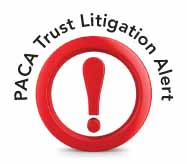 Savvy credit managers need to understand how to use restrictive endorsements to their advantage and how to deal with any restricted check they may receive.
Savvy credit managers need to understand how to use restrictive endorsements to their advantage and how to deal with any restricted check they may receive.
As a matter of policy, a company should make it a practice not to deposit any check containing a restrictive endorsement until they have discussed the issue with their legal counsel.
With that said, here is an overview of what credit managers should know about accord and satisfaction:
To constitute a valid accord and satisfaction it is essential that what is given shall be offered in full satisfaction and extinction of the original debt. That the debtor shall intend it as a full satisfaction of the original debt and that such intention shall be made known to the creditor in some unmistakable manner.
It is equally important that the creditor shall have accepted it with the intention that it should operate as a full satisfaction of the original debt.
Generally, an accord and satisfaction requires:
-
a bona fide dispute, plus
-
tender which is clearly made as payment in full.
1 Am. Jur. Accord & Satisfaction, Section 22 et. seq. See also Louis Caric & Sons v. Ben Gatz Co., 38 Agric. Dec. 1486 (1979); Mendelson-Zeller Co. v. Michael J. Navilio, Inc., 34 Agric. Dec. 903 (1975); Kelman Farms v. Bushman Brokerage, 34 Agric. Dec. 1146 (1975); Mendelson-Zeller Co. v. The Season Produce Co., 31 Agric. Dec. 1288 (1972).
“To constitute an accord and satisfaction it is necessary that the money be offered in full satisfaction of the demand, and be accompanied by such acts and declarations as amount to a condition that the money, if accepted, is accepted in satisfaction; and it must be such that the party to whom it is offered is bound to understand therefrom that, if he takes it, he takes it subject to such conditions. The mere fact that the creditor receives less than the amount of his claim, with knowledge that the debtor claims to be indebted to him only to the extent of the payment made, does not necessarily establish an accord and satisfaction.”
Spada Distributors Co. v. Frank KenworthyCo., 17 Agric. Dec. 347 (1958). (emphasis added). Quoted in Mendelson-Zeller Co. v. The Season Produce Co., 31 Agric. Dec. 1288 (1972).
Clear and CONSPICUOUS terms required
Words: “This check is in settlement of the following invoices: . . .” and words: “This check is in settlement of the following. If incorrect please return.” did NOT constitute clearly conditional tender. Half Moon Fruit & Produce Co. v. North American Produce, 40 Agric. Dec. 1610 (1981) (emphasis added); Harvitz Brothers v. David Goldsamt, 20 Agric. Dec. 391 (1961).
Words: “Payment in Full” or “similar words” held effective. Kelman Farms v. Bushman Brokerage, 34 Agric. Dec. 1146 (1975) (emphasis added); Southmost Vegetable Co-Op v. M. & G. Tomato, 28 Agric. Dec. 966 (1969); Johnson & Allen v. Fernandez Bros., 27 Agric. Dec. 1127 (1968); Zinno v. Marvin, 24 Agric. Dec. 396 (1965); National Produce Distributors, Inc. v. Stewart Produce, 21 Agric. Dec. 955 (1962) [Transaction lacked bona fide dispute, and check was not offered in good faith where accord language was pre-printed on the check].
Where a partial payment check was tendered on the condition that it be accepted as payment in full, but debtor did not specify to what debt it was to be applied, and there were several open accounts at the time of tender, creditor was within its rights when it applied the payment to an open freight bill, and no accord and satisfaction of the produce debt was accomplished. Jody DeSomma d/b/a Impact Brokerage v. All World Farms, Inc., 61 Agric. Dec. 821 (2002).
Bona Fide Dispute Required!
One of the biggest misuses of restrictive endorsements arise from the mistaken belief that placing a restrictive endorsement on all checks as a matter of company policy provides some benefit if a unknowing recipient deposits a partial payment. NOT TRUE! There must be a bona fide or good faith dispute that the partial payment is intended to resolve. A “gotcha” move will not carry the day and will be resolved in the payee’s favor.
Although respondent’s partial payment checks stated that the checks were tendered as payment in full, it was found that no accord and satisfaction existed as to several transactions because respondent had not proven that a dispute existed between the parties as to such transactions. Eustis Fruit Company, Inc. v. The Auster Company, Inc., 51 Agric. Dec. 865 (1992). Where a Respondent presented evidence of a breach by the Complainant this was not enough to show that there had been a dispute. Richard Ruiz v. Pacific Sun Produce Co., 48 Agric. Dec. 1105 (1989).
Good Faith Tender As Full Payment Necessary
Debtor tendered payment in one check for six produce transactions. Four of the transactions were undisputed, and the check covered these transactions in their full amount. The remaining two transactions were disputed, and as to these the check tendered only partial payment. The creditor negotiated the check, and then sought to recover the balance alleged due on the disputed transactions. The debtor pled accord and satisfaction. It was held that the good faith tender requirement of UCC 3-311 would not be met by such a check, especially in view of the “full payment promptly” requirement of the Act and Regulations. Lindemann Produce, Inc. v. ABC Fresh Mktg., Inc., et al., 57 Agric. Dec. 7389 (1998).
In C. H. Robinson Company v.TrademarkProduce, Inc., 53 Agric. Dec. 1861 (1994) the words “Full and Final Payment” were pre-printed on all of respondent’s checks in very small type. Referencing Official Comment 4 to UCC Section 3-311 it was held that the requirement of “good faith tender” had not been met, and there was no accord and satisfaction.
Although respondent’s partial payment checks stated that the checks were tendered as payment in full, it was found that no accord and satisfaction existed as to one transaction because there was no manifested intent that the payment should apply to all the items on the invoice where respondent paid in full for one of the types of fruit. Eustis Fruit Company, Inc. v. The Auster Company, Inc., 51 Agric. Dec. 865 (1992).
Return the Check!
Under UCC Section 3-311 the return within 90 days of an amount paid in full satisfaction of a claim disputed in good faith precludes the discharge of the claim. Pacific Tomato Growers, LTD v. American Banana Co., Inc., 60 Agric. Dec. 352 (2001). Simply put, you must return the check containing a restrictive endorsement to the sender within 90 days of your receipt. If you keep it as a partial payment you will be deemed to have accepted full payment.
BEST PRACTICES
- If you use a lock box service to receive payments, consider notifying your bank in writing not to deposit any checks containing a restrictive endorsement. Instead, these checks should be forwarded directly to the company for assessment.
- If you place a restrictive endorsement on a check, use the correct terminology and make it CONSPICUOUS.
- Do not bundle or combine payment for both disputed and undisputed invoices. You may lose the benefit of the restrictive endorsement if there is not a bona fide dispute.
- Always reference the disputed invoice the check is intended to resolve.
- Be prepared to return the partial payment if you are not willing to accept it as full payment.
- Return the check in a timely manner and include a cover letter articulating your position.
- Don’t deposit checks containing a restrictive endorsement until you have assessed the situation.






